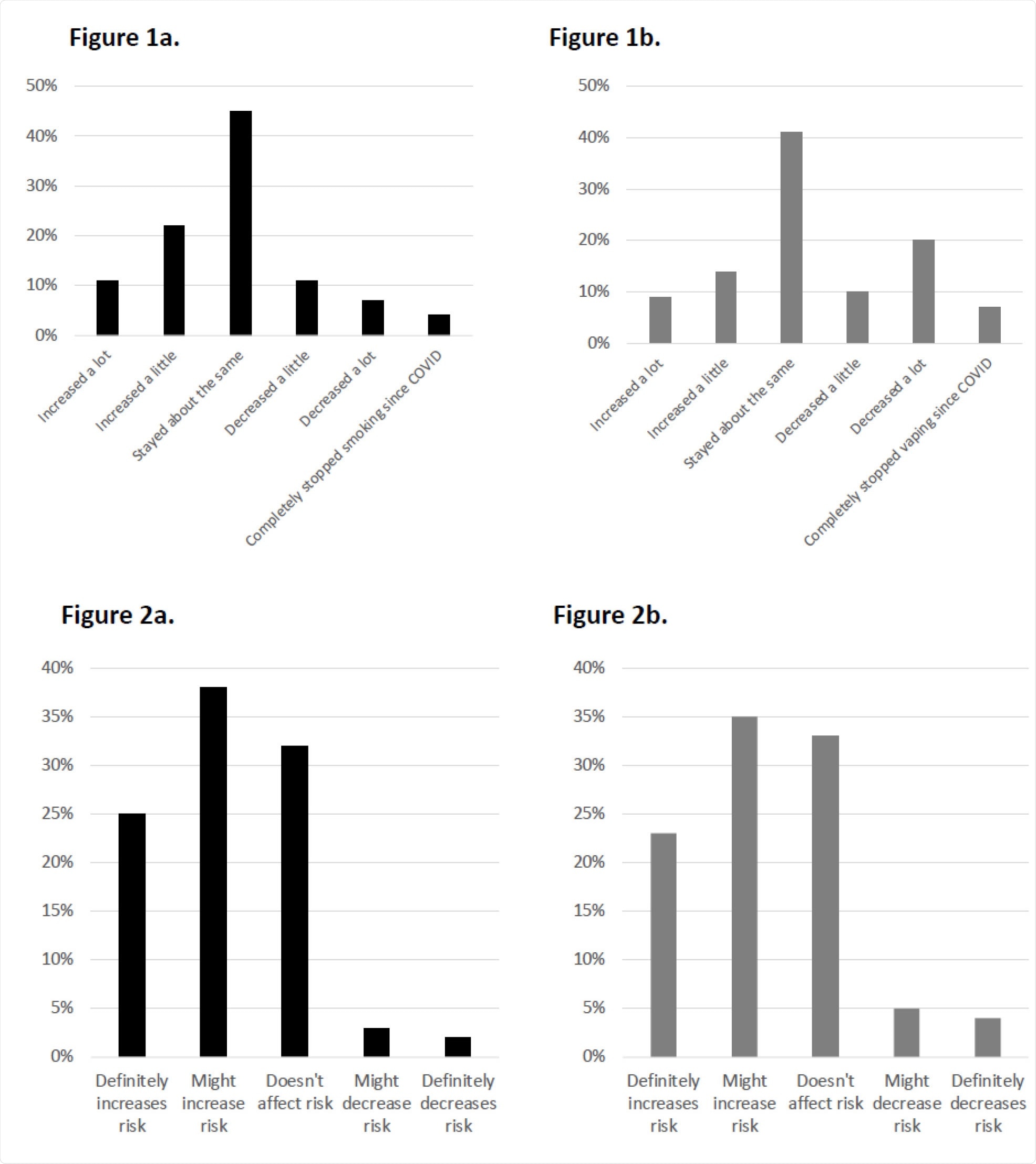During the coronavirus disease (COVID-19) pandemic, caused by the severe acute respiratory syndrome coronavirus 2 (SARS-CoV-2), some people are at a higher risk of developing severe complications.
Some of these include the elderly, those with underlying health conditions, and people with weakened immune systems. Previous studies have also tied cigarette smoking as a risk factor for SARS-CoV-2 infection.
With concerns about cigarette smoking being a risk factor for severe illness from COVID-19, understanding nicotine and tobacco use patterns is essential for preventive efforts.
Researchers at the Massachusetts General Hospital aimed to understand the changes in cigarette and e-cigarette use behaviors among adults in the United States. They found that a third of cigarette smokers and a quarter of vape or e-cigarette users increased their use during the pandemic, mainly due to stress.
Meanwhile, 26 percent and 41 percent of cigarette smokers and e-cigarette users, respectively, reported trying to quit during the pandemic. The users perceive that their use of these products increases their risk for COVID-19 or a more severe outcome of the infection.

 This news article was a review of a preliminary scientific report that had not undergone peer-review at the time of publication. Since its initial publication, the scientific report has now been peer reviewed and accepted for publication in a Scientific Journal. Links to the preliminary and peer-reviewed reports are available in the Sources section at the bottom of this article. View Sources
This news article was a review of a preliminary scientific report that had not undergone peer-review at the time of publication. Since its initial publication, the scientific report has now been peer reviewed and accepted for publication in a Scientific Journal. Links to the preliminary and peer-reviewed reports are available in the Sources section at the bottom of this article. View Sources
Study background
The coronavirus pandemic is far from over. As it continues to pose a threat to healthcare systems, the management of potentially modifiable factors tied to the risk of severe illness or death is essential for preventive efforts. These include smoking cigarettes.
Smoking increases the risk of respiratory viral and bacterial infections. It is also tied to worse outcomes for those infected with SARS-CoV-2. Also, it is well known that cigarette smoke reduces respiratory immune defenses, and the behavioral aspect of smoking, like hand-to-mouth movement, may contribute to a heightened viral transmission.
Past evidence and health organizations have tagged smoking as a risk factor for severe disease from SARS-CoV-2 infection. Meanwhile, data on the link between e-cigarette use and COVID-19 outcomes is lacking. But there has been concern about vaping being tied to increased COVID-19 risk among younger people.
It is essential to understand specific issues in COVID-19 and smoking, including how smoking relates to compliance to protective behaviors. Understanding these can help to evaluate clinical risk, develop health messaging, and detect targets for interventions.
The study
To arrive at the study findings, which appeared on the pre-print server, medRxiv*, the team conducted a cross-sectional survey of 1,024 adults who are more than 18 years old, reporting past 6-month use of cigarettes or e-cigarettes.
They were recruited to participate in the Amerispeak Panel study through the mail, telephone, and field interviews.
The team found that among the smokers, 45 percent reported no change in cigarette smoking, while 33 percent increased cigarette smoking since the emergence of COVID-19 due to stress.

(a) Opinion about cigarette smoking and risk of getting COVID-19 or having a more serious outcome among past 6-month cigarette smokers. (b) Opinion about ecigarette use/vaping and risk of getting COVID-19 or having a more serious outcome among past 6-month e-cigarette users/vapers.
The researchers found factors with various forms of stress – total stress, financial problems, and increasing working hours. All these contribute to increased combustible cigarette use.
Further, the team found that higher stress levels were linked to increased cigarette smoking. About 41 percent of e-cigarette users reported no change in vaping, while 23 percent reported increasing use. Also, 26 percent of cigarette smokers and 41 percent of e-cigarette smokers attempted to quit because of COVID-19.
“The study findings highlight the range of behavioral responses that users of addictive products have had in response to an ongoing pandemic,” the researchers noted in the study.
Overall, the team found that the survey provides a glimpse of smoking among people during the pandemic and how they perceive quitting.
“Outreach to smokers and e-cigarette users to provide cessation assistance during this time may help to support quit attempts and reduce stress-related increases in product use,” the team added.
The team also recommended the proactive provision of cessation support to help people who want to stop smoking. The support may help reduce stress-related increases in product use during the pandemic.

 This news article was a review of a preliminary scientific report that had not undergone peer-review at the time of publication. Since its initial publication, the scientific report has now been peer reviewed and accepted for publication in a Scientific Journal. Links to the preliminary and peer-reviewed reports are available in the Sources section at the bottom of this article. View Sources
This news article was a review of a preliminary scientific report that had not undergone peer-review at the time of publication. Since its initial publication, the scientific report has now been peer reviewed and accepted for publication in a Scientific Journal. Links to the preliminary and peer-reviewed reports are available in the Sources section at the bottom of this article. View Sources
Journal references:
- Preliminary scientific report.
Kalkhoran, S., Levy, D., Rigotti, N. (2021). Smoking and Vaping Among a National Sample of U.S. Adults During the COVID-19 Pandemic. medRxiv, https://doi.org/10.1101/2021.03.18.21253902 https://www.medrxiv.org/content/10.1101/2021.03.18.21253902v1
- Peer reviewed and published scientific report.
Kalkhoran, Sara M., Douglas E. Levy, and Nancy A. Rigotti. 2021. “Smoking and E-Cigarette Use among U.S. Adults during the COVID-19 Pandemic.” American Journal of Preventive Medicine, October. https://doi.org/10.1016/j.amepre.2021.08.018. https://www.ajpmonline.org/article/S0749-3797(21)00499-2/fulltext.